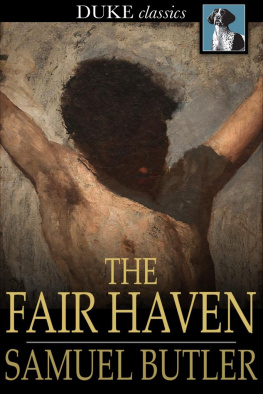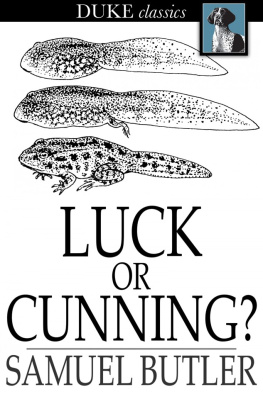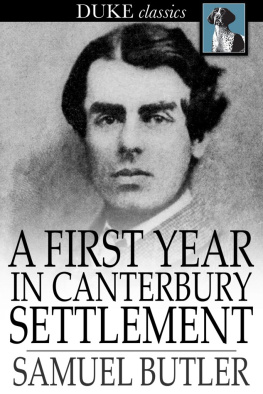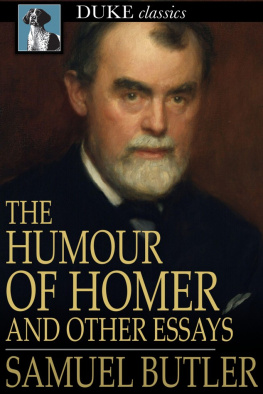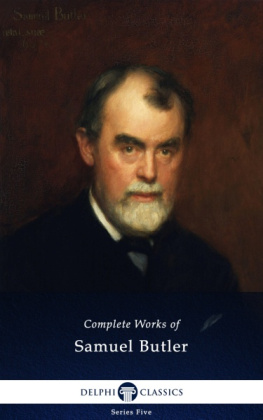THE FAIR HAVEN
* * *
SAMUEL BUTLER
*
The Fair Haven
First published in 1873
ISBN 978-1-62012-274-7
Duke Classics
2012 Duke Classics and its licensors. All rights reserved.
While every effort has been used to ensure the accuracy and reliability of the information contained in this edition, Duke Classics does not assume liability or responsibility for any errors or omissions in this book. Duke Classics does not accept responsibility for loss suffered as a result of reliance upon the accuracy or currency of information contained in this book.
Contents
*
Introduction by R. A. Streatfeild
*
The demand for a new edition of The Fair Haven gives me anopportunity of saying a few words about the genesis of what, thoughnot one of the most popular of Samuel Butler's books, is certainlyone of the most characteristic. Few of his works, indeed, show morestrikingly his brilliant powers as a controversialist and hisimplacable determination to get at the truth of whatever engaged hisattention.
To find the germ of The Fair Haven we should probably have to go backto the year 1858, when Butler, after taking his degree at Cambridge,was preparing himself for holy orders by acting as a kind of laycurate in a London parish. Butler never took things for granted, andhe felt it to be his duty to examine independently a good many pointsof Christian dogma which most candidates for ordination accept asmatters of course. The result of his investigations was that heeventually declined to take orders at all. One of the stones uponwhich he then stumbled was the efficacy of infant baptism, and I haveno doubt that another was the miraculous element of Christianity,which, it will be remembered, was the cause of grievous searchings ofheart to Ernest Pontifex in Butler's semi-autobiographical novel, TheWay of All Flesh. While Butler was in New Zealand (1859-64) he hadleisure for prosecuting his Biblical studies, the result of which hepublished in 1865, after his return to England, in an anonymouspamphlet entitled "The Evidence for the Resurrection of Jesus Christas given by the Four Evangelists critically examined." This pamphletpassed unnoticed; probably only a few copies were printed and it isnow extremely rare. After the publication of Erewhon in 1872, Butlerreturned once more to theology, and made his anonymous pamphlet thebasis of the far more elaborate Fair Haven, which was originallypublished as the posthumous work of a certain John Pickard Owen,preceded by a memoir of the deceased author by his supposed brother,William Bickersteth Owen. It is possible that the memoir was thefruit of a suggestion made by Miss Savage, an able and witty womanwith whom Butler corresponded at the time. Miss Savage was so muchimpressed by the narrative power displayed in Erewhon that she urgedButler to write a novel, and we shall probably not be far wrong inregarding the biography of John Pickard Owen as Butler's trial tripin the art of fictiona prelude to The Way of All Flesh, which hebegan in 1873.
It has often been supposed that the elaborate paraphernalia ofmystification which Butler used in The Fair Haven was deliberatelydesigned in order to hoax the public. I do not believe that this wasthe case. Butler, I feel convinced, provided an ironical frameworkfor his arguments merely that he might render them more effectivethan they had been when plainly stated in the pamphlet of 1865. Hefully expected his readers to comprehend his irony, and heanticipated that some at any rate of them would keenly resent it.Writing to Miss Savage in March, 1873 (shortly before the publicationof the book), he said: "I should hope that attacks on The Fair Havenwill give me an opportunity of excusing myself, and if so I shallendeavour that the excuse may be worse than the fault it is intendedto excuse." A few days later he referred to the difficulties that hehad encountered in getting the book accepted by a publisher: " were frightened and even considered the scheme of the bookunjustifiable. urged me, as politely as he could, not to do it,and evidently thinks I shall get myself into disgrace even amongfreethinkers. It's all nonsense. I dare say I shall get into a row--at least I hope I shall." Evidently there is here no anticipationof The Fair Haven being misunderstood. Misunderstood, however, itwas, not only by reviewers, some of whom greeted it solemnly as adefence of orthodoxy, but by divines of high standing, such as thelate Canon Ainger, who sent it to a friend whom he wished to convert.This was more than Butler could resist, and he hastened to issue asecond edition bearing his name and accompanied by a preface in whichthe deceived elect were held up to ridicule.
Butler used to maintain that The Fair Haven did his reputation noharm. Writing in 1901, he said:
"The Fair Haven got me into no social disgrace that I have ever beenable to discover. I might attack Christianity as much as I chose andnobody cared one straw; but when I attacked Darwin it was a differentmatter. For many years Evolution, Old and New, and UnconsciousMemory made a shipwreck of my literary prospects. I am only nowbeginning to emerge from the literary and social injury which thosetwo perfectly righteous books inflicted on me. I dare say theyabound with small faults of taste, but I rejoice in having writtenboth of them."
Very likely Butler was right as to the social side of the question,but I am convinced that The Fair Haven did him grave harm in theliterary world. Reviewers fought shy of him for the rest of hislife. They had been taken in once, and they took very good care thatthey should not be taken in again. The word went forth that Butlerwas not to be taken seriously, whatever he wrote, and the results ofthe decree were apparent in the conspiracy of silence that greetednot only his books on evolution, but his Homeric works, his writingson art, and his edition of Shakespeare's sonnets. Now that he haspassed beyond controversies and mystifications, and now that hisother works are appreciated at their true value, it is not too muchto hope that tardy justice will be accorded also to The Fair Haven.It is true that the subject is no longer the burning question that itwas forty years ago. In the early seventies theological polemicswere fashionable. Books like Seeley's Ecce Homo and Matthew Arnold'sLiterature and Dogma were eagerly devoured by readers of all classes.Nowadays we take but a languid interest in the problems thatdisturbed our grandfathers, and most of us have settled down intowhat Disraeli described as the religion of all sensible men, which nosensible man ever talks about. There is, however, in The Fair Havena good deal more than theological controversy, and our Laodicean agewill appreciate Butler's humour and irony if it cares little for hispolemics. The Fair Haven scandalised a good many people when itfirst appeared, but I am not afraid of its scandalising anybody now.I should be sorry, nevertheless, if it gave any reader a falseimpression of Butler's Christianity, and I think I cannot do betterthan conclude with a passage from one of his essays which representshis attitude to religion perhaps more faithfully than anything in TheFair Haven: "What, after all, is the essence of Christianity? Whatis the kernel of the nut? Surely common sense and cheerfulness, withunflinching opposition to the charlatanisms and Pharisaisms of aman's own times. The essence of Christianity lies neither in dogma,nor yet in abnormally holy life, but in faith in an unseen world, indoing one's duty, in speaking the truth, in finding the true liferather in others than in oneself, and in the certain hope that he wholoses his life on these behalfs finds more than he has lost. Whatcan Agnosticism do against such Christianity as this? I should beshocked if anything I had ever written or shall ever write shouldseem to make light of these things."

